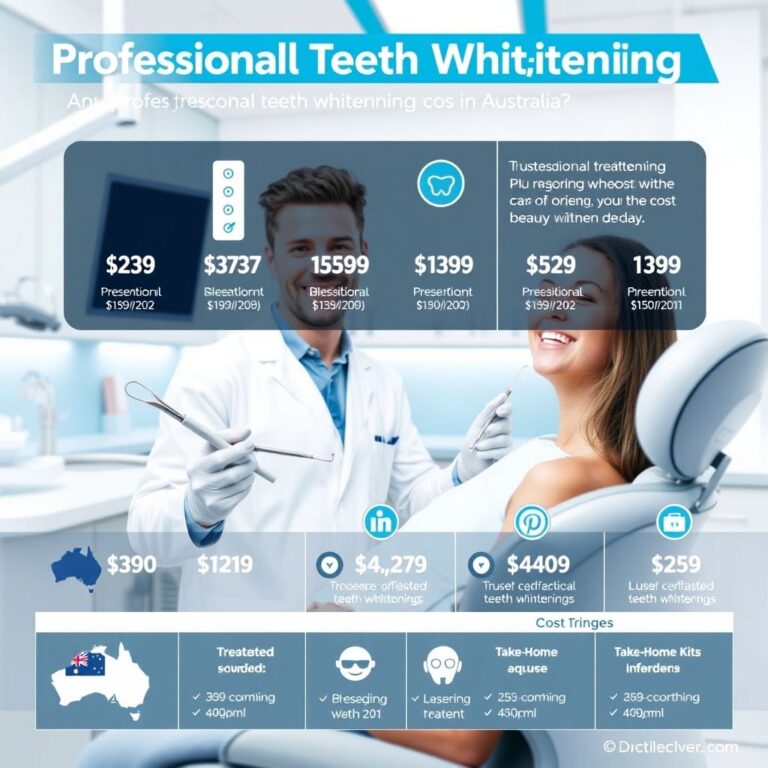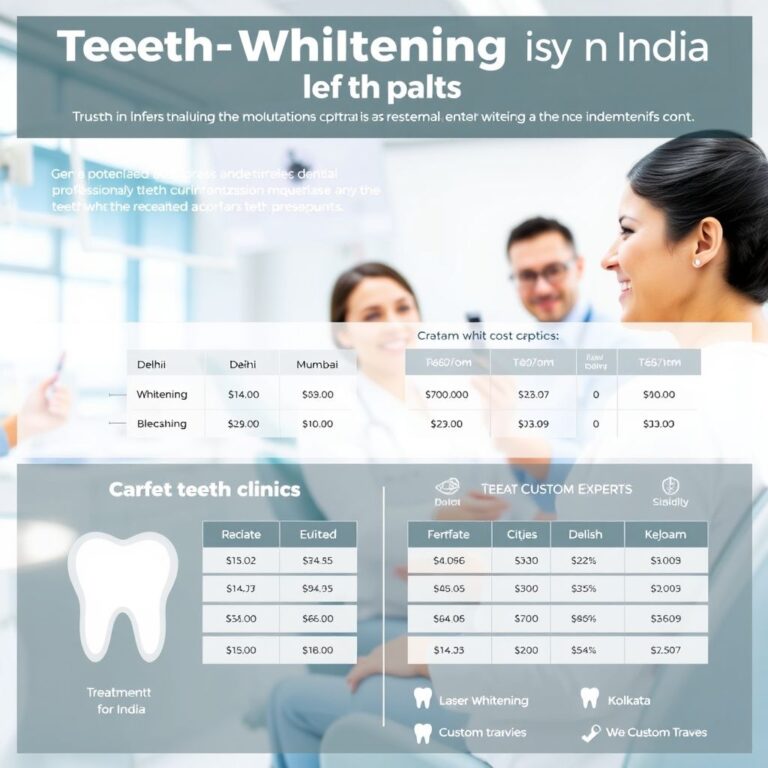Comprehensive Guide to Teeth Whitening Procedure Costs
A bright, white smile is often associated with health, beauty, and confidence. As a result, teeth whitening has become one of the most sought-after cosmetic dental procedures worldwide. This comprehensive guide delves into the intricacies of teeth whitening procedure costs, focusing on the various methods available, the costs associated with them, and factors influencing these costs. We’ll also explore the benefits and risks, as well as tips for maintaining your newly whitened teeth.

Chapter 1: Understanding Teeth Whitening
1.1 What is Teeth Whitening?
Teeth whitening is a cosmetic dental procedure designed to lighten the color of your teeth. This is achieved by removing stains and discoloration, resulting in a brighter and more aesthetically pleasing smile. Teeth whitening can be performed in a dental office, at home using dentist-provided kits, or with over-the-counter products.
1.2 Why Do Teeth Become Discolored?
Several factors contribute to tooth discoloration, including:
- Diet: Consuming certain foods and drinks, such as coffee, tea, red wine, and berries, can stain teeth over time.
- Tobacco Use: Smoking or chewing tobacco can lead to significant tooth discoloration.
- Age: As we age, the outer layer of enamel on our teeth wears away, revealing the yellowish dentin beneath.
- Medications: Some medications, like tetracycline antibiotics, can cause tooth discoloration.
- Poor Dental Hygiene: Inadequate brushing and flossing can lead to plaque and stain buildup.
1.3 Types of Teeth Stains
Teeth stains can be classified into two main categories:
- Extrinsic Stains: These occur on the surface of the teeth and are usually caused by external factors such as food, drink, and tobacco. Extrinsic stains are typically easier to remove.
- Intrinsic Stains: These occur within the tooth and are often the result of aging, trauma, or medication. Intrinsic stains can be more challenging to treat and may require more intensive whitening procedures.
Chapter 2: Teeth Whitening Methods
2.1 In-Office Whitening
In-office whitening, also known as chairside bleaching, is performed by a dental professional. This method offers the most dramatic results in the shortest amount of time.
- Procedure: The dentist applies a high-concentration peroxide gel to the teeth, which is activated using a special light or laser. The process usually takes about an hour.
- Cost: The average cost of in-office teeth whitening ranges from $300 to $1,000 per session, depending on the dentist’s location and expertise.
2.2 At-Home Whitening Kits (Provided by Dentists)
Dentist-provided at-home whitening kits offer a more gradual whitening process compared to in-office treatments.
- Procedure: The dentist creates custom-fitted trays for the patient, who then applies a lower-concentration peroxide gel to the trays and wears them for a specified period each day, typically for a few weeks.
- Cost: These kits generally cost between $200 and $400.
2.3 Over-the-Counter Whitening Products
Over-the-counter (OTC) products are widely available and include whitening strips, gels, toothpaste, and rinses.
- Procedure: OTC products vary in application methods and peroxide concentrations. They are generally less effective than professional treatments but can still provide noticeable results.
- Cost: The cost of OTC whitening products ranges from $20 to $100.
2.4 Natural Teeth Whitening Methods
Some people prefer to use natural methods for teeth whitening, although these are typically less effective than professional treatments.
- Methods: Common natural whitening methods include baking soda, hydrogen peroxide, and oil pulling.
- Cost: These methods are usually inexpensive, costing only a few dollars for the necessary ingredients.
Chapter 3: Factors Influencing Teeth Whitening Costs
3.1 Geographic Location
The cost of teeth whitening can vary significantly based on the geographic location of the dental practice. Urban areas and regions with a higher cost of living tend to have higher prices for dental procedures.
3.2 Dentist’s Expertise and Reputation
A dentist with specialized training and a strong reputation in cosmetic dentistry may charge more for their services. Additionally, the quality of care and results may justify the higher cost.
3.3 Type of Whitening Procedure
As discussed in Chapter 2, different whitening methods come with varying costs. In-office treatments are generally the most expensive, followed by dentist-provided at-home kits, and then OTC products.
3.4 Severity of Discoloration
The extent of tooth discoloration can impact the cost of whitening treatments. More severe stains may require multiple sessions or a combination of methods, increasing the overall expense.
3.5 Additional Treatments
Sometimes, additional dental work may be necessary before teeth whitening can be performed. This can include treatments for cavities, gum disease, or other oral health issues, adding to the total cost.
Chapter 4: Benefits of Teeth Whitening
4.1 Improved Appearance
The most obvious benefit of teeth whitening is the enhancement of your smile’s appearance. Whiter teeth can make you look younger and more attractive.
4.2 Boosted Confidence
A brighter smile can significantly boost your self-confidence, making you more comfortable in social and professional interactions.
4.3 Motivation for Better Oral Hygiene
After investing in teeth whitening, many people feel motivated to maintain their results by improving their oral hygiene habits.
4.4 Safe and Effective
When performed by a dental professional, teeth whitening is a safe and effective procedure. Modern whitening agents and techniques minimize the risk of damage to your teeth and gums.
Chapter 5: Risks and Considerations
5.1 Tooth Sensitivity
One of the most common side effects of teeth whitening is increased tooth sensitivity. This usually subsides within a few days after the treatment.
5.2 Gum Irritation
Whitening agents can sometimes cause irritation to the gums. This is more likely with higher-concentration gels and improper application techniques.
5.3 Temporary Results
Teeth whitening is not permanent, and results can fade over time, especially with exposure to staining substances like coffee, tea, and tobacco. Touch-up treatments may be necessary to maintain your desired level of whiteness.
5.4 Not Suitable for Everyone
Teeth whitening may not be suitable for individuals with certain dental conditions, such as severe tooth decay, gum disease, or extremely sensitive teeth. It’s important to consult with a dental professional before undergoing any whitening treatment.
Chapter 6: Tips for Maintaining Whitened Teeth
6.1 Practice Good Oral Hygiene
Brushing and flossing regularly can help prevent new stains from forming and maintain the results of your whitening treatment.
6.2 Avoid Staining Substances
Limiting your intake of foods and drinks that can stain your teeth, such as coffee, tea, red wine, and berries, can help prolong the effects of whitening.
6.3 Use a Straw
When consuming beverages that can stain your teeth, using a straw can minimize contact with your teeth and reduce the risk of staining.
6.4 Touch-Up Treatments
Periodic touch-up treatments, either at home or in-office, can help maintain your teeth’s whiteness over time.
6.5 Regular Dental Check-Ups
Regular visits to your dentist for professional cleanings and check-ups can help keep your teeth healthy and free from stains.
Conclusion
Teeth whitening is a popular and effective cosmetic dental procedure that can enhance your smile and boost your confidence. With various methods available, from in-office treatments to at-home kits and natural remedies, there’s a solution to fit every budget and lifestyle. Understanding the costs and factors influencing them can help you make an informed decision and achieve the bright, white smile you’ve always desired.
FAQs
1. How long do teeth whitening results last? The duration of teeth whitening results varies depending on the method used and individual habits. On average, results can last from six months to two years, with touch-up treatments helping to maintain whiteness.
2. Is teeth whitening safe? Yes, when performed by a dental professional or following the instructions of at-home kits, teeth whitening is generally safe. However, some people may experience temporary sensitivity or gum irritation.
3. Can anyone undergo teeth whitening? Teeth whitening is not suitable for everyone. Individuals with severe tooth decay, gum disease, or extremely sensitive teeth should consult with a dental professional before undergoing any whitening treatment.
4. How can I reduce tooth sensitivity after whitening? To reduce tooth sensitivity after whitening, you can use toothpaste designed for sensitive teeth, avoid very hot or cold foods and drinks, and consult with your dentist for additional recommendations.
5. Are over-the-counter whitening products effective? Over-the-counter whitening products can be effective for mild to moderate stains, but they typically do not provide the same level of results as professional treatments. For significant discoloration, professional whitening is recommended.
Additional Resources
- American Dental Association (ADA): www.ada.org
- Mayo Clinic – Teeth Whitening: www.mayoclinic.org
- WebMD – Teeth Whitening: www.webmd.com
By understanding the various aspects of teeth whitening, you can make an informed decision and achieve a bright, white smile that enhances your appearance and confidence.


